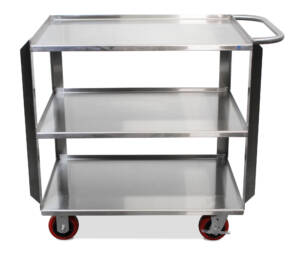Choosing the Right type of Utility or Food Service Carts
Carts are important companions in a food service environment. There are a number of things to consider when choosing the right cart. First, it is important to decide how it will be used and the environment where it will be used. Carts come in all shapes and sizes – with light, medium or heavy duty options.
Once you determine how the cart will be used, you can figure out what floor surfaces your companion will be traveling; Smooth surfaces such as tile, vinyl flooring, or indoor concrete – your cart is headed for a smooth ride. However, uneven surfaces such as uneven flooring, asphalt or carpeting present more of a challenge. Casters are designed for different surfaces and you have many options.
There are a few more things to consider – load capacity, type of casters, gauge of material (for durability), height, and number/types of shelving. Let’s look at some of the options available to you to help you decide what is best for you and your company.
Cart Material:
Powder coated steel, polyethylene, aluminum or stainless steel will all work well in dry environments. However, stainless or aluminum would be the proper choice for carts used in wet or food environments.
Shelves Gauge:
The thickness of the shelf (material) is referred to as the “gauge”. Generally speaking, the lower the gauge of the steel that is used, the thicker the shelf. For example, a cart constructed with 12-gauge steel will be considerably stronger and more durable than one made of 18-gauge material. Many carts in the market are produced from 18 or 20 gauge. When carts are overloaded, the shelving bends or “bows”. ELA standardizes on 12 gauge, to prevent this problem from happening.
Cart Load Capacity:
An important consideration when selecting the right casters for your cart is the load capacity. And what about locks? Will your cart need brakes or locking casters? We recommend locks for carts that are used on uneven surfaces to stabilize the cart. Understanding how much weight you will be transporting and over which type of surface will help you determine which caster material you need as well.
Number of Shelves of a cart:
How many will you need – and what style will best suit your needs? Flat shelving, or shelving that has a lip? Lips help contain the contents on the cart during transport.
Height of Food Service Cart:
In food environments, one consideration is having a cart the same height as the prep table. The height of the cart is also important when considering carts for bussing or the washroom. Carts in a production room may need to be level with the processing area, production line or conveyor belt.
While standard carts may meet many user’s basic needs, a custom cart may well offer the most cost-effective solution. If you choose wisely, this companion will be around for a long time.
Call or email us…
714-738-0397 or info@elaent.com

Stainless Steel 3 three shelf cart
